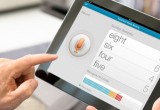HID and Tyco deliver FICAM for PACs, G&D providing national IDs in Iraq
01 November, 2013
category: Biometrics, Contactless, Digital ID, Government, NFC, Smart Cards
Baltimore/Washington Int’l Airport installs biometric readers with Lumidigm software
Lumidigm will provide its V-Series multispectral fingerprint sensing software for use with Innometriks’ Rhino biometric readers to control access to the BWI’s tarmac.
A large percentage of BWI’s 9,700 employees are already enrolled, with the system handling tens of thousands of transactions daily. The Rhino readers, some of which will be installed outside in the elements, are also fully integrated with IntelliSoft software for template capture and card creation.
Multispectral imaging is a proprietary technology developed by Lumidigm that overcomes the fingerprint capture problems that conventional imaging systems have in rugged conditions. Lumidigm’s technology uses multiple spectrums of light and advanced optical techniques to extract unique fingerprint characteristics from both the surface and subsurface of the skin. The subsurface images are important because the fingerprint ridges seen on the surface of the finger has a foundation beneath the surface of the skin in the capillary beds and other sub-dermal structures.
HID Global, Tyco deliver first FICAM-compliant physical access solution
A partnership between HID Global and Tyco Security products has produced a FICAM-compliant solution for physical access control systems.
The solution leverages each company’s federal identity solutions, providing added value through increased security, cost efficiencies and interoperability. The U.S. General Services Administration (GSA) introduced the new FICAM testing requirements earlier this year as part of a realignment of its Approved Products List with the FICAM roadmap for standardization. Also part of the realignment is a more consistent approach to the deployment and management of identity assurance, credentialing and access control services.
The joint venture uses HID’s pivCLASS Registration Engine, which integrates with Tyco’s Software House C•CURE 9000, for PIV and PIV-I card validation, provisioning and de-provisioning for when a certificate is no longer valid. Credentials presented at the door are cryptographically challenged. If the card is authentic and valid, the card identifier is passed to the Software House iSTAR controller, which then performs the authorization check before admitting the cardholder. A special messaging interface ensures that all invalid transactions are captured and forwarded to the C•CURE 9000 PACS event monitor.
Verint acquires Victrio, enhances voice biometrics offerings
Verint has announced its acquisition of Victrio, a voice biometric and data science company, to extend its capabilities in biometrics market. With the addition of voice biometrics, Verint is offering solutions that heighten the level of security available to contact centers in an effort to improve the customer experience.
The merger of of Victrio with Verint will yield an integrated solution that is comprised of Victrio’s voice and predictive analytics and Verint’s Workforce Optimization (WFO) recording and desktop and speech analytics solutions.
Victrio’s technology combines a new generation of “passive” voice biometrics with predictive analysis that can accurately detect fraudsters and authenticate customers without caller interruption. Victrio’s voice biometrics solution is ideally suited for large financial institutions, banks, card issuers, wealth management service providers and other organizations focused on fraud reduction.
Giesecke & Devriant to provide Iraq with citizen eID cards
Giesecke & Devriant have announced their selection by the Republic of Iraq to provide the country’s citizens with electronic personal identification credentials.
As the general contractor for the initiative, G&D will provide the smart cards, personalization system, IT and data acquisition infrastructure and any technical support or maintenance service over the course of the contract.
The eID card contract has a minimum term of five years, and will provide Iraq with an contemporary, high-security ID system that will prevent manipulation and identity theft. The new eIDs will also streamline the administrative processes across the country, as the new ID credentials are already prepared for use by eGovernment applications.
The new contactless smart card IDs include an option to integrate a variety of biometric features and because they also feature a photo of the holder, they can be used as standard photo ID as well. The Republic of Iraq has a population of over 30 million people, and G&D will set up some 2,500 data acquisition stations and 25 regional personalization centers across the country to help establish the new ID system.
Canada taps Datacard Group to provide passport printer technology
The Datacard Group has been selected to provide passport printer technology for Passport Canada’s (PPTC) passport issuance program.
Datacard’s selection was made by Canadian Bank Note Company Limited (CBN). As the contract holder, CBN is responsible for the design and development of the overall solution including the personalization software, cryptographic components and the design and manufacture of the electronic passports.
CBN will leverage Datacard’s PB6500 passport issuance system for central issuance, but Datacard will also conduct regional issuance as well as provide a secure, thin film overlay with both overt and covert security elements to protect the data contained on the passports.
GlobalPlatform releases specs for trusted user interface on mobile devices
GlobalPlatform, the standardization body for the management of applications on secure chip technology, has published a technical document for software developers that details the implementation of trusted applications in the trusted execution environment (TEE).
The document is entitled “Trusted User Interface API Specification v1.0,” and details the specific mode in which a mobile device is controlled by the TEE – the secure area that resides in the main processor of a smartphone or mobile device, ensuring that sensitive data is stored, processed and protected. The trusted UI verifies that the information displayed on a mobile device screen comes from an approved trusted application and is isolated from the rich operating system (OS), which is vulnerable to malicious malware attacks.
GlobalPlatform’s new specification document details how a trusted UI should facilitate information to be securely configured by the end user and securely controlled by the TEE. The standardization of the mode aims to reduce development cost, promote industry consistency and encourage market interoperability.




